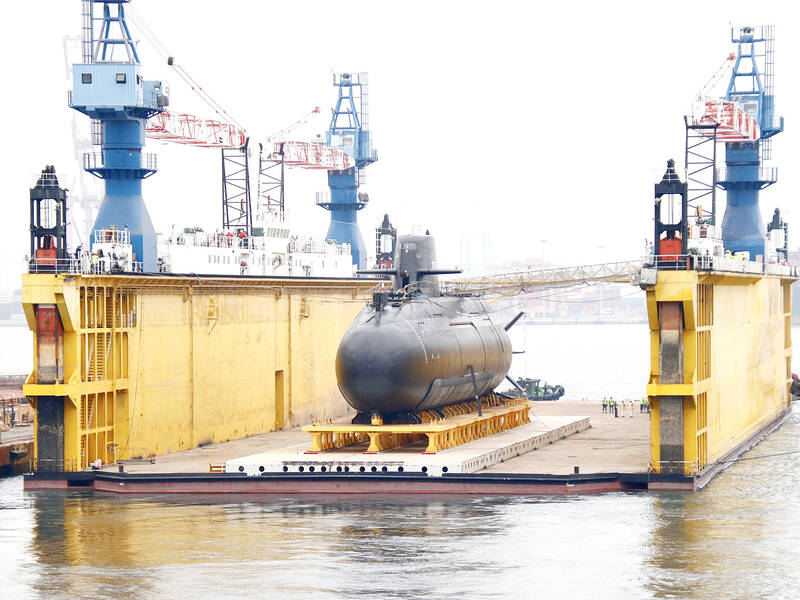Although the government’s budget proposal for next year includes funding to build new submarines, challenges remain before a second domestically developed submarine could be finished by 2027.
The Executive Yuan last week approved the Ministry of National Defense’s plan to spend NT$284 billion (US$8.89 billion) building seven advanced submarines from next year to 2038. Initial funding of about NT$2 billion would be listed in the ministry’s budget proposal for the next fiscal year, which it is this week to deliver to the Legislative Yuan for deliberation.
Minister of National Defense Wellington Koo (顧立雄) last month said that the submarine funding would be used only after the Hai Kun (海鯤, “Narwhal”), the nation’s first indigenous defense prototype submarine, passes a sea acceptance test.

Photo: Lee Hui-chou, Taipei Times
Retired navy admiral Huang Shu-kuang (黃曙光), who oversaw the development of the Hai Kun, last year said he hoped that Taiwan would have at least three combat-ready submarines by next year and four by 2027.
Based on that timeline, the Hai Kun must by next year join the navy’s combat fleet, which includes two Chien Lung-class submarines, while a second domestically built submarine must be combat-ready by 2027.
The Kaohsiung-based CSBC Corp, Taiwan, which built the Hai Kun, has remodeled the apron and replenished machinery needed to build submarines. The construction of a second locally built submarine could begin once the funding and components are in place.
CSBC Corp, Taiwan chairman Cheng Wen-lon (鄭文隆) last year told the Liberty Times (the Taipei Times’ sister newspaper) that 861 of its employees in Kaohsiung work on the submarine projects, accounting for one-third of its workforce there.
Many shipbuilding engineers have been developed in the past six to seven years, he said.
To build the nation’s first prototype submarine, the company had to find multiple suppliers for crucial components in Europe and the US, including backup suppliers.
However, challenges remain ahead for the submarine-building project. Huang resigned in April as the convener of the program, citing health reasons, while Cheng resigned this month, and was succeeded by former National Cheng Kung University vice president Huang Cheng-hung (黃正弘).
Another key figure in overseeing the project is Vice Admiral Shao Wei-yang (邵維揚), but he is to retire after he turns 65. Whether he would be allowed to postpone his retirement, or supervise the project in other official capacities, remains to be seen.
The budget for the 14-year submarine-building project, which is double that of the defense ministry’s military investment in one year, might face opposition in the legislature.
Although CSBC Corp, Taiwan has secured suppliers for components, and Taiwan also aims to raise the percentage of Taiwan-made components in the submarine program, the government must be prepared to tap into backup supplies given the rapidly changing geopolitical situation.
Additional reporting by Shelley Shan

‘DENIAL DEFENSE’: The US would increase its military presence with uncrewed ships, and submarines, while boosting defense in the Indo-Pacific, a Pete Hegseth memo said The US is reorienting its military strategy to focus primarily on deterring a potential Chinese invasion of Taiwan, a memo signed by US Secretary of Defense Pete Hegseth showed. The memo also called on Taiwan to increase its defense spending. The document, known as the “Interim National Defense Strategic Guidance,” was distributed this month and detailed the national defense plans of US President Donald Trump’s administration, an article in the Washington Post said on Saturday. It outlines how the US can prepare for a potential war with China and defend itself from threats in the “near abroad,” including Greenland and the Panama

A wild live dugong was found in Taiwan for the first time in 88 years, after it was accidentally caught by a fisher’s net on Tuesday in Yilan County’s Fenniaolin (粉鳥林). This is the first sighting of the species in Taiwan since 1937, having already been considered “extinct” in the country and considered as “vulnerable” by the International Union for Conservation of Nature. A fisher surnamed Chen (陳) went to Fenniaolin to collect the fish in his netting, but instead caught a 3m long, 500kg dugong. The fisher released the animal back into the wild, not realizing it was an endangered species at

The Chinese Nationalist Party (KMT) is maintaining close ties with Beijing, the Democratic Progressive Party (DPP) said yesterday, hours after a new round of Chinese military drills in the Taiwan Strait began. Political parties in a democracy have a responsibility to be loyal to the nation and defend its sovereignty, DPP spokesman Justin Wu (吳崢) told a news conference in Taipei. His comments came hours after Beijing announced via Chinese state media that the Chinese People’s Liberation Army’s Eastern Theater Command was holding large-scale drills simulating a multi-pronged attack on Taiwan. Contrary to the KMT’s claims that it is staunchly anti-communist, KMT Deputy

The High Prosecutors’ Office yesterday withdrew an appeal against the acquittal of a former bank manager 22 years after his death, marking Taiwan’s first instance of prosecutors rendering posthumous justice to a wrongfully convicted defendant. Chu Ching-en (諸慶恩) — formerly a manager at the Taipei branch of BNP Paribas — was in 1999 accused by Weng Mao-chung (翁茂鍾), then-president of Chia Her Industrial Co, of forging a request for a fixed deposit of US$10 million by I-Hwa Industrial Co, a subsidiary of Chia Her, which was used as collateral. Chu was ruled not guilty in the first trial, but was found guilty